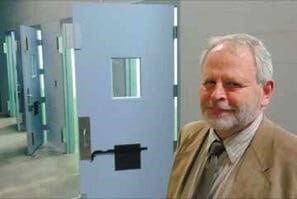News: In the News
GP Sobering Center preps for clients
By Shaun Hall of the Daily Courier

GRANTS PASS, Ore.- A sobering idea is about to come to fruition in a converted recycling building along Southwest Foundry Street.
Today, an open house and ribbon-cutting ceremony was held at the Grants Pass Sobering Center, which is soon expected to be the temporary home for people too intoxicated to care for themselves.
“Law enforcement says we’re going to be busy,” says Rick Jones, chairman of the center’s board of directors.
Hope and gritty reality will come together once the center begins operations, expected to be later this month. Jones gave a quick tour of the center on Friday.
Just inside the main doors is a chair with restraints. A nearby computer shows the view from 28 cameras.
Jones, making a comment about the amount of cleaning supplies on hand, said, “You would think we’re getting ready for people to throw up.”
He is allowed to be blunt. A former drug addict and alcoholic himself, Jones is director of Choices Counseling Center in Grants Pass. “I’ve been doing this for 40 years,” he says.
The hope is to keep people safe, and to give them a chance to clear their heads. Maybe, they’ll take a hint and get some help, too.
Police officers will bring them in. Those considered a danger to themselves or others will be the target. Upon arrival, their belongings will be stored, their vitals checked and their condition assessed.
Some might need to go to the hospital. “I’m real happy we’re right around the corner from AMR (ambulance),” Jones says.
Jones described the center’s intake protocols as “pretty stout.”
After check-in, the intoxicated person will be taken by an officer to a sobering room.
It’s an individual room, not a multi-person drunk tank, which would be considered unsafe. It’s a bare, bathroom-sized cell with a metal toilet-sink combination and room for a floor mat. All is easy to clean. The doors of the rooms are locked. There’s a total of 12 of the small rooms at the facility.
“Very safe,” Jones says. “It’s all based on their safety and our safety.”
If they’re hungry, there’s soup. There’s coffee, water and gatorade, too. It helps hydrate.
“Not a restaurant,” Jones says.
There’s a laundry room and “transition room.” Before leaving, they can meet there with workers who can refer them to treatment programs.
“The ultimate goal is to get people referred where they need to go, once they’re sober,” Jones says.
The average stay will be about 10 or 11 hours, although some might leave in as little as four or five. An alcohol level that has dropped to .05 percent allows for discharge. Pat Murphey will manage the center, modeled after a similar one he worked at in Medford.
Legislative funding, corporate donations and other donors helped make the project a reality. Ausland Group handled design and construction.
Ongoing funding will be a challenge, although Jones hopes for continued support from AllCare, PrimaryHealth of Josephine County and Asante, among others.
Jones predicted that the center will help discourage “professional vagrants,” who will be without their personal belongings, drinking buddies, cigarettes and intoxicants while sobering up.
“Some of these folks will be looking for the next town,” he said. “It’s not set up to be comfortable. It’s safe.”
Ausland offers complete capital improvement expertise in development consulting, engineering and construction. For more information visit us at www.auslandgroup.com.
Ausland Group | April 22, 2016






 Facebook
Facebook LinkedIn
LinkedIn